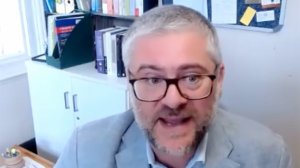University of the Witwatersrand’s Southern Centre for Inequality Studies Adjunct Professor Michael Sachs argued on Tuesday that budget allocation is supposed to reflect a country’s policy objective targets, however, he noted that the South African government’s programme has been increasingly conflicted.
Sachs was speaking at financial services company PSG Konsult’s Think Big webinar, where he noted that South Africa’s economy has been declining and has stagnated for more than a decade.
The country’s per capita income had also been declining and while the Constitution imposed a policy imperative on government to secure rising access to economic and social goods, Sachs noted that if the resource base of the economy continued to decline and stagnate it would be impossible to meet this commitment.
He said there was a robust budget system in the country and a lot of expenditure allocation between provinces, municipalities and across government departments driven by robust formulas. There was a lot of discretion in the allocation of expenditure, he added.
“I do think there is a greater deal of uncertainty in the economy about the future direction of the economy than we have seen in our lifetimes. To the extent that the budget depends on revenue and revenue depends on the path of economic growth everybody is struggling to predict what will happen in the next few years, not only the government,” Sachs said.
He highlighted how the country controlled expenditure, explaining that when the budget system was designed the idea was a path of expenditure put down for the next three years.
“It’s what is called the medium term expenditure framework, which was supposed to be reflective of a real estimate of the cost of implementing government programmes,” he explained.
Unfortunately this had changed over the last ten years, he noted, and particularly over the last five years government’s programme had become increasingly conflicted.
He said there were many different policies moving in many different directions.
Sachs noted that there was a lot of uncertainty, not only about the economy, but about what government’s policy programme was. He added that in a context of uncertainty the budget had become less and less credible, not because there was a dearth of technical expertise in National Treasury but because government’s programme was more and more confused.
He said Treasury had increasingly resorted to using the budget not as a good estimate of how much the country would spend in the next three years, but as a negotiation position.
“And a good example of that is the number put on the budget for the wage increase for this year was 0, so the budget was constructed on the assumption that there would be a 0 wage increase for all public servants, implying in this high inflation environment a very large shock to incomes. I do not think that was ever realistic or credible and that is the reason why we are now left with this large apparent shock on the budget numbers,” he said.
Sachs said the budget was a political process that relied on a democratic mandate, saying leading up to the 2024 national government elections an additional element of pressure was being put on decision-makers who ultimately respond to popular impulses.
“As we go into the election, things like the resources made available for the extension of the social grants system will be from a political point of view - [it would be] madness to withdraw the Covid social distress relief grant just before the elections. I do not think any politician will agree to that,” he said.
EMAIL THIS ARTICLE SAVE THIS ARTICLE ARTICLE ENQUIRY
To subscribe email subscriptions@creamermedia.co.za or click here
To advertise email advertising@creamermedia.co.za or click here










